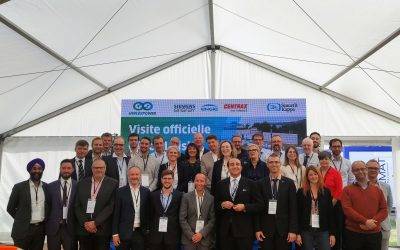Study Reveals Influence of Urban Environment on Mental Health
New Study Reveals Urban Environment May Influence Mental Health Through Neurobiological Pathways
A groundbreaking new study has shed light on how urban environments can impact mental health through complex neurobiological pathways. The study conducted by researchers from Charité – Universitätsmedizin Berlin, Fudan University Shanghai, Tianjin Medical University in China and the European environMENTAL consortium analysed the data of 156,075 participants to investigate the relationship between urban environments and psychiatric symptoms. Three distinct environmental profiles were identified to be associated with depression, anxiety and emotional instability, respectively. The results were published in Nature Medicine.
More than 50% of the world population lives in urban areas, and by 2050, two-thirds will live in cities. Urban-living individuals are exposed to numerous environmental factors that may combine and interact to influence mental health. While individual factors of urban environment have been investigated in isolation, no attempt has been made so far to model how complex, real-life exposure to living in the city relates to brain and mental health, and how this is influenced by genetics.
Using data of 156,075 participants from the UK Biobank, the team identified urban living environmental profiles and related them to psychiatric symptoms. They also identified regional brain areas that mediated the effect of the different environmental profiles on psychiatric symptoms.
The researchers found an environmental profile of social deprivation, air pollution, street network and urban land use density that was related to higher symptoms of depression, which were mediated by brain volume differences. These brain volume differences were found in regions known to process reward. The degree of brain volume change depended on variations in genes related to stress response. Protective factors such as greenness and generous destination accessibility were related with fewer anxiety symptoms, mediated by brain regions necessary for emotion regulation. The third urban environmental profile was related to an emotional instability symptom group.
Prof. Gunter Schumann, Head of the Centre for Population Neurosciences and Stratified Medicine (PONS) at Charité – Universitätsmedizin Berlin and Fudan University Shanghai, explains: “We aim to understand what combinations of environmental factors are most relevant for psychiatric symptoms. By providing evidence for comprehensive urban environmental profiles that affect distinct groups of psychiatric symptoms and are mediated by different brain mechanisms, our results characterised biological mechanisms underlying complex, real-life environmental adversity.”
This study is the first attempt to model how living in complex urban environments relates to brain and mental health and provides important insights into the relationships between urban environments and psychiatric symptoms. The findings have important implications for urban planners, city policymakers, and mental health professionals. The quantification of the contribution of each environmental factor to brain and psychiatric symptoms and their interplay in an urban living environment can aid in targeting and prioritising future public health interventions.
Original publication
Xu, J., Liu, N., Polemiti, E. et al. Effects of urban living environments on mental health in adults. Nat Med (2023). https://doi.org/10.1038/s41591-023-02365-w
Further information
www.environmental-project.org
Twitter: @HEenvironMENTAL
LinkedIn: environMENTAL EU Project
Press contact
Florian Riegel
Senior Communications Manager
ARTTIC Innovation GmbH
Tel: +49 89 2488303 29
florian.riegel@arttic-innovation.de
This work was co-funded by UK Research and Innovation (UKRI) under the UK government’s Horizon Europe funding guarantee (10041392 and 10038599) as part of the Horizon Europe HORIZON-HLTH-2021-STAYHLTH-01 under grant agreement number 101057429.
The information and views set out in this press release are those of the author(s) and do not necessarily reflect the official opinion of the European Union. Neither the European Union institutions and bodies nor any person acting on their behalf may be held responsible for the use which may be made of the information contained therein.
ARTTIC Innovation GmbH has been advising research and innovation projects for more than 33 years. As project management and communication partner, we make sure that our projects run successfully and that project results and events are disseminated in the best possible way. ARTTIC is a subsidiary of the PNO Group, one of the largest consultancies for publicly funded projects in research and development. For more information, please visit www.arttic-innovation.de.
Why the carousel of amendments to the R&D tax credit law continues to turn
The R&D tax credits in 2024The year 2024 has proven to be decisive for the German R&D tax credits. Following the most recent amendment as part of the Growth Opportunities Act in March, the Federal Government realized during the budget consultations for 2025...
Register Now: In Conversation with EBiSC2
Unlocking the Potential of Stem Cells: Discover the EBiSC Journey to SustainabilityJoin the conversation on the initiative that’s shaping the future of biomedical research! On May 15, 2024, from 14:15 to 15:00 CEST (Europe/Brussels time), the Innovative Health...
The R&D tax credit with a blind eye to earnings –
Why loss-making companies (wrongly) hesitate
Recapitulation The German R&D tax credit has become much more popular in recent years after a modest response following the introduction of the instrument. This can be seen not only in advertising and studies by various associations, but also in the bare figures...
Junior Funding Consultant (m/f/d)
We offer you the unique opportunity to become part of a successful & young team in the attractive growth market for tax-incentivised research funding (R&D tax credits). We are looking for Junior Funding Consultants with a passion for innovation, scientific...
First successful demonstration with 100% green H2
HYFLEXPOWER celebrates successful operation of a gas turbine with 100% green H2On October 12, 2023, at a public event hosted at the HYFLEXPOWER demonstrator site in Saillat-sur-Vienne, France, the HYFLEXPOWER consortium unveiled a ground-breaking achievement - the...
New Security Project AGILE Will Improve Disaster Risk Management
New international security project to improve disaster risk management for unexpected eventsThe international security project AGILE will kick start today. The project is to develop novel tools and methodologies for understanding, anticipating, and managing High...
SYNERGISE for Improved Disaster Management
Internationally Funded Project to Develop an Integrated Toolkit for Improved Management of Natural and Man-Made Disasters Kicks-Off TodayTo boost the efficiency and safety of first responders during life-saving missions, the SYNERGISE team will develop a Novel...
Junior Innovation Consultant (m/f/d)
We offer you the unique opportunity to become part of a dynamic team in the attractive field of innovation and research. We are looking for Innovation Consultants with a passion for innovation, scientific writing and project management. This position is for recent...
Senior Innovation Consultant (m/f/d)
We offer you the unique opportunity to become part of a dynamic team in the attractive field of innovation and research. We are looking for specialists with a passion for innovation, scientific writing and project management. This position is for experienced...
Business Developer (m/f/d)
We are looking for specialists in business development with a strong sales talent and an interest in innovation, research and science. This position is for recent graduates or experienced professionals and involves assisting clients from a variety of industries with...









